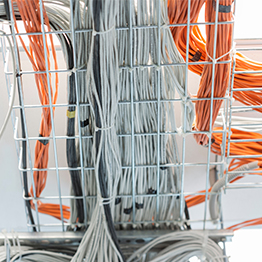
Tray cables are versatile and durable electrical cables used for power, control, and signal transmissions in various industrial environments. They are specifically designed for installation in cable trays, raceways, or other protected areas. Tray cables are ideal for settings that require mechanical protection and resistance to moisture, heat, and other harsh conditions.
Key Characteristics of Tray Cables
Construction
Tray cables are typically made with multi-conductor designs that are insulated and jacketed to provide protection from mechanical damage, chemicals, and other environmental hazards. They may include copper or aluminum conductors, depending on the application.
Insulation and Jackets
The insulation materials used in tray cables vary but are commonly made from thermoplastic or thermoset materials like PVC (Polyvinyl Chloride) or XLPE (Cross-Linked Polyethylene). These materials offer excellent resistance to high temperatures, chemicals, and abrasion. The outer jacket adds additional protection and can be made from materials such as PVC or neoprene.
Voltage Ratings
Tray cables are rated for specific voltage levels, typically ranging from 600V to 2000V, depending on the application’s requirements. This allows them to be used in a wide range of industrial and commercial electrical systems.
Flame and Heat Resistance
Tray cables are often flame-retardant and heat-resistant, making them suitable for environments with elevated temperatures or potential fire risks. Many tray cables are also rated for use in hazardous locations, such as oil refineries and chemical plants, where safety is paramount.
Applications of Tray Cables
Tray cables are commonly used in industries such as manufacturing, oil and gas, utilities, and renewable energy. Typical applications include:
- Power Distribution: Tray cables are used to distribute power across industrial plants, commercial buildings, and power generation facilities.
- Control Circuits: They are used in control systems for machinery, automation, and other electrical equipment.
- Instrumentation: Tray cables carry low-voltage signals for instrumentation and monitoring systems in industrial environments.
- Lighting: These cables are suitable for connecting lighting systems, especially in areas exposed to harsh conditions.
Advantages of Tray Cables
Tray cables are valued for their durability and flexibility in challenging environments. Their construction provides excellent protection from physical damage, while their insulation offers chemical resistance and flame retardance. Additionally, tray cables are relatively easy to install in cable trays, conduits, or raceways, which simplifies wiring in large facilities.
Conclusion
Tray cables are an essential component in modern industrial and commercial electrical systems. Their versatility, durability, and ability to handle a range of voltages and environments make them indispensable for various power, control, and signal applications. By choosing the appropriate tray cable for your project, you ensure safe and reliable performance in even the harshest conditions.

